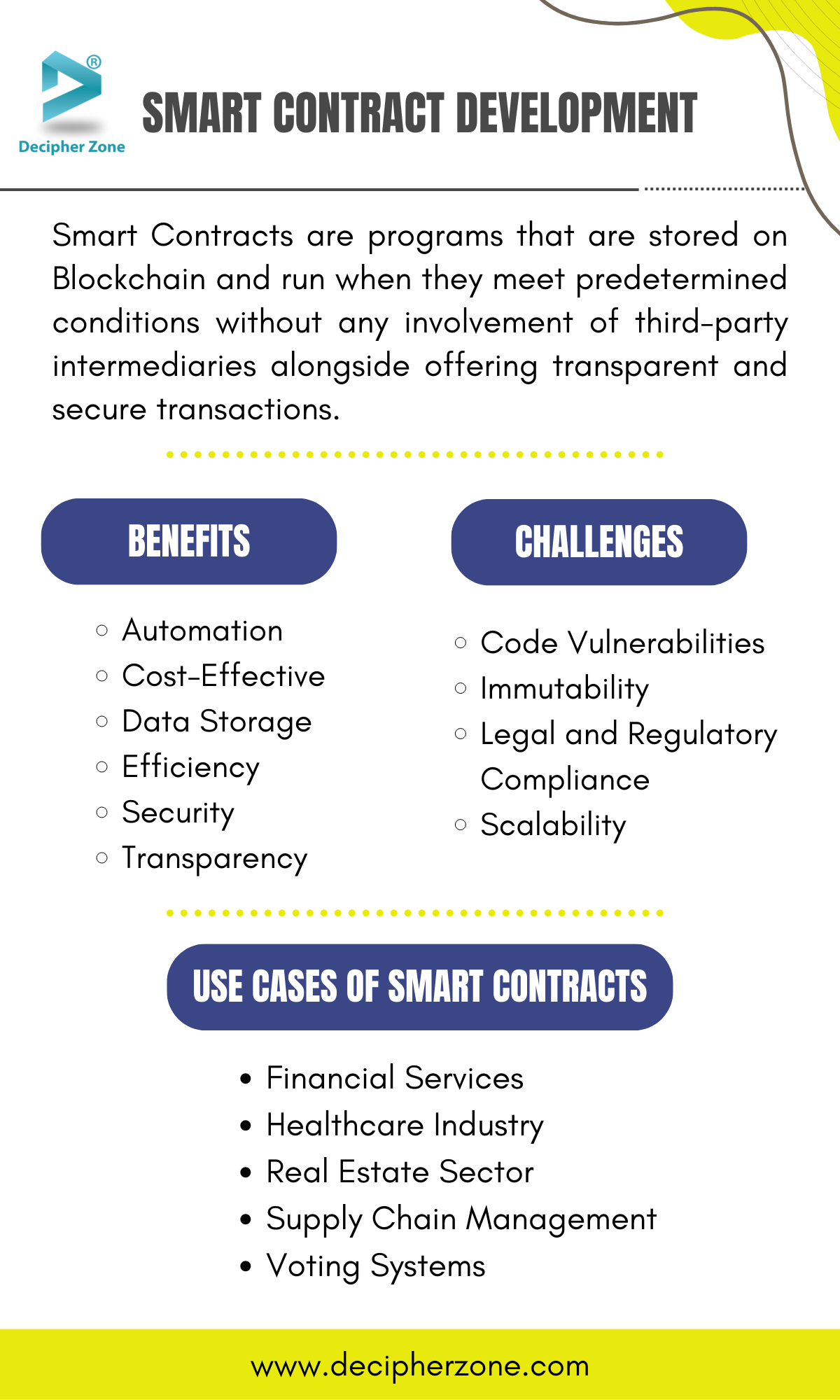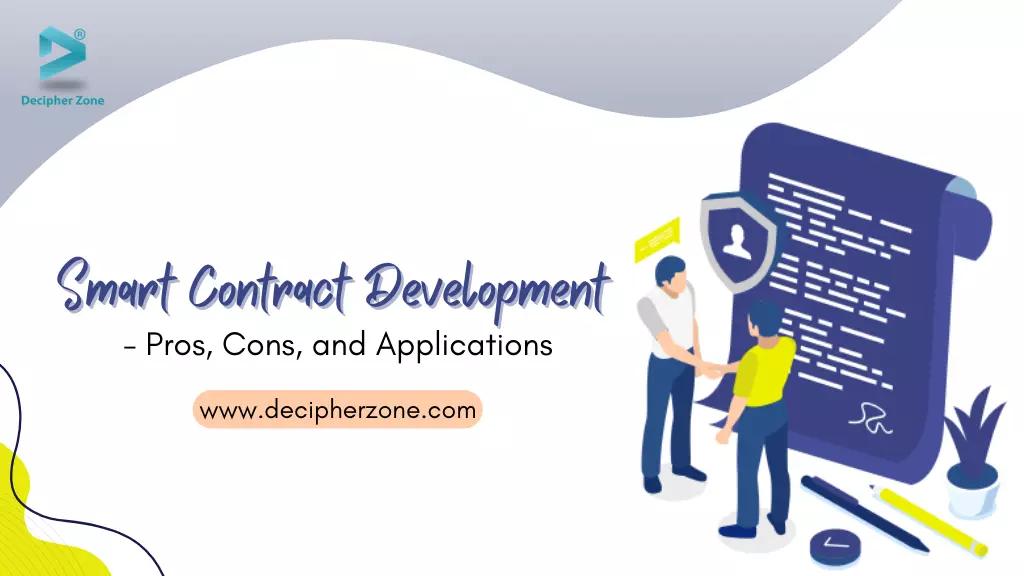Blockchain has been the ultimate advancement in the technology and IT industry and has been offering various industries automated and secure solutions. And with blockchain comes some of its essential characteristics and applications for which it is majorly known, like smart contracts, transparent transactions, faster settlements, decentralization, and many others.
According to the reports from Grand View Research, the worldwide smart contracts market was valued at $684.3 million in 2022 and is expected to grow to a CAGR of 82.2% in 2030, which exhibits signs of impeccable growth when considering smart contract development.
In this blog, we will fill you up with Smart contracts, one of the most trending blockchain applications, along with its benefits, challenges, and cost.
So, without any further ado, let us get started!
Smart Contract Development
Smart Contracts are programs that are stored on Blockchain and run when they meet predetermined conditions. These contracts are executed easily and automatically without any third-party intermediaries while performing the specified actions along with offering secure and transparent transactions.
Read: Role of Blockchain in Fintech
In addition, these contracts are based on a specific set of terms and conditions, which helps in ensuring trust between the parties involved. It also leverages the capabilities of blockchain technology which in turn facilitates executing and enforcing agreements automatically along with reduced human errors.
Read: Blockchain in Gaming
Some of the recognizable smart contract development tools, programming languages, and libraries include Solidity, Rust, Truffle, Vyper, DappTools, Waffle, Saddle, Web3j, Defender, Scilla, and many more.
Benefits of Smart Contract Development
Blockchain caters to innumerable benefits, and when specifically discussing smart contract development, it also possesses several benefits.
Read: Consensus Algorithms in Blockchain
Now, that you have an idea of what smart contracts are, let us move forward and fill you up on the benefits, and they are as follows -
-
Cost-Effective
-
Data Storage
-
Efficiency
-
Security
-
Transparency
Automation - It helps in streamlining the agreement process by automating the tasks and reducing intervention, which helps in saving time along with increased efficiency.
Cost-Effective - Cost is an important factor in the software development process, and when it comes to Smart contracts, it helps in reducing the amount of paperwork without any need for intermediaries, which facilitates making it a cost-effective solution for businesses.
Data Storage - Smart contracts also help with easy data storage and backup options which enables you to access the contracts and the related data anytime and anywhere, alongside preventing data loss and theft by offering easy restore options.
Efficiency - Another benefit of smart contract development is that it helps in increasing the efficiency of businesses by automation and eliminating the intermediaries from the process, which in turn also helps in saving the time and effort that is required to execute agreements with ease.
Security - Smart contracts are an essential feature of blockchain technology, and as blockchain is already known for its security, so smart contracts possess the same feature, which implies that they are highly secured with cryptographic hashes and algorithms along with different layers of encryption, thus making them immutable.
Transparency - Blockchain is decentralized which makes smart contracts decentralized and transparent along with providing the involved parties to view and verify the contract before starting with the execution process.
Read: Decentralized Marketplace Development

Challenges in Smart Contract Development
And some of the challenges in smart contracts are as follows -
-
Code Vulnerabilities
-
Immutability
-
Legal and Regulatory Compliance, and
Now moving along, as you’ve now learned about the benefits of smart contract development, you should also learn about the challenges that you might come across during the development process, and knowing the problem is very important as it helps you analyze the business requirements and develop a future-proof solution for your business.
Read: Integrated Security System
Code Vulnerabilities - Everything that can be programmed or coded is prone to errors and so are smart contracts. So, when developing a smart contract make sure to write code precisely and test at every stage, this will help you eliminate the risks and avoid the exploiters.
Immutability - It is another challenge that you might face while developing smart contracts. So, while developing smart contracts, write codes accurately as once the smart contracts are deployed on the blockchain they cannot be easily altered, thus influencing the security and other aspects of smart contracts.
Legal and Regulatory Compliance - With smart contracts in their initial stage, there are no specific rules and regulations set, which can be a barrier when these contracts can vary according to various jurisdictions causing uncertainty for businesses.
Scalability - Since smart contracts are at the initial stage of adoption there are certain limitations in terms of scalability. When considering smart contract development at a large scale, it can lead to more serious issues in case of an increased number of transactions like slow transaction speed, increased fees, and many others.
Read: Kiosk Software Development
Although there are not many challenges in smart contract development, make sure that you conduct thorough research and do proper analysis to eliminate them to develop a future-proof, scalable, and reliable solution for your business.
Read: Flutter App Development
Use Cases of Smart Contract Development
Use cases are another integral part of smart contract development. Especially in those industries in which smart contracts have made an impression, so it is important to understand the business logic and uses in different industries, and the popular ones are as follows -
-
Financial Services, for banking and other financial institutions to enable quick, secure, transparent transactions, and also to keep the finance-related customer data safe from being hacked or altered.
-
Used in the Healthcare Industry to keep sensitive patient data safe ensuring privacy and building customer trust in the organization.
-
In the Real Estate sector, to make property-related transactions seamless, which also saves time and money by eliminating the costs associated with the middleman.
-
In Supply Chain Management, to track and verify the movements of the goods, ensuring transparency and security alongside reducing the risk of fraud.
-
Smart contracts for Voting Systems, to enable tamper-proof systems thus enhancing the integrity of electronic voting and creating transparency with the general public.
Read: Financial Software Development Cost
Wrapping It Up
The Blockchain network is growing at a fast pace, with adoption in every sector for the benefits it provides. This technology facilitates some of the best features and characteristics, among which one of them is Smart Contracts. These smart contracts not only have disrupted traditional contracts but have also changed the very nature of conducting business in today’s era.
So, if you are interested in smart contract development, then why wait?
Connect with us now, or hire a blockchain developer and collaborate with us for an efficient, effective, reliable, and secure solution for your businesses.
FAQs: Smart Contract Development
What are the primary components of smart contracts?
The primary components of smart contracts are decentralized storage, digital identities, terms and conditions, and tokens and assets.
What are some of the well-known smart contract platforms?
Some of the well-known smart contract platforms include Polkadot, Ethereum, Solana, TRON, Chainlink, Hyperledger, Cardano, and many more.
What are the latest trends in smart contract development?
With smart contracts evolving rapidly, some of the trends that have been gaining momentum recently are -
-
Artificial intelligence
-
Integration of the Internet of Things
-
Interoperability, and
-
Adoption of DeFi (Decentralized Finance).

